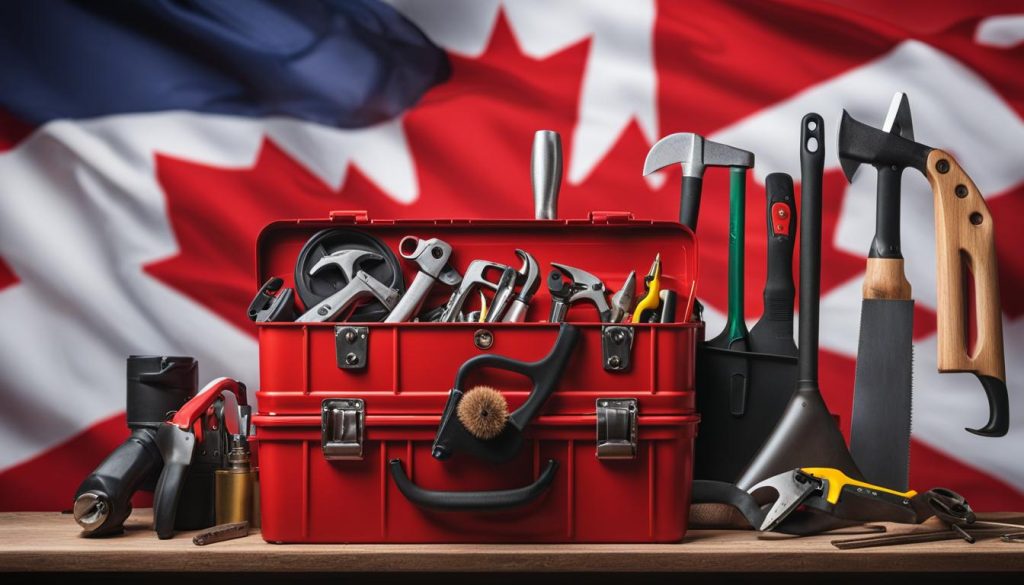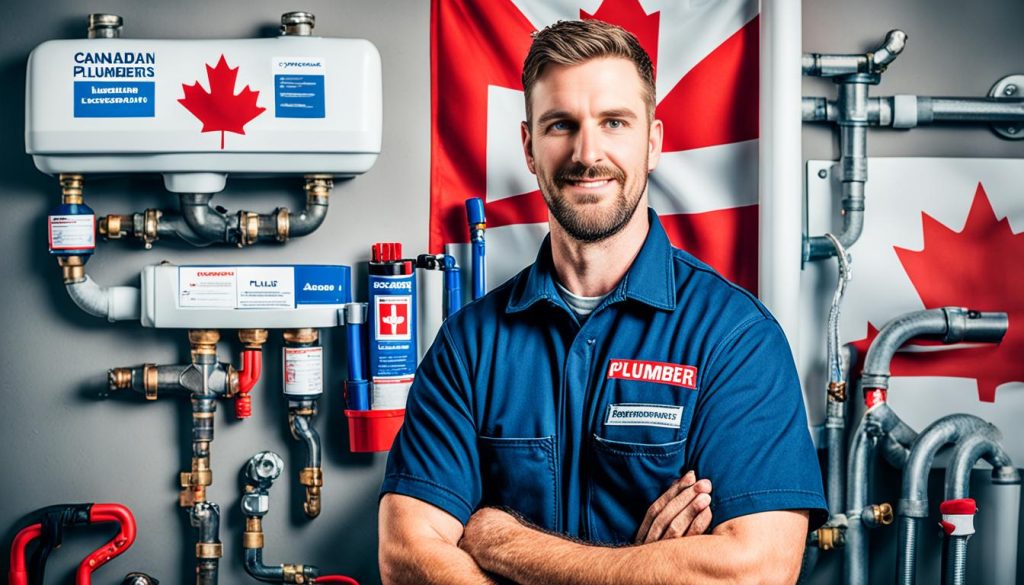Earn Your Plumbing License in Canada Easily
Did you know that being a licensed plumber in Canada can lead to a rewarding and lucrative career? With the increasing demand for plumbing services, there has never been a better time to become a certified plumber.
If you’re wondering how to get your plumbing license and what the requirements and exams entail, this article will guide you through the process step by step. Whether you’re starting from scratch or looking to expand your career opportunities, we’ve got you covered.
Key Takeaways:
- Enroll in a pre-apprenticeship training program to gain essential knowledge and skills.
- Find a working plumber to become your mentor and embark on an apprenticeship.
- Pass a certification exam to become a licensed plumber in your province.
- Consider earning a Red Seal certification for nationwide recognition.
- The plumbing profession offers excellent career prospects and income potential.
Pre-Apprenticeship Training
If you’re new to the plumbing profession, I highly recommend starting with a pre-apprenticeship training program. These programs are designed to provide the essential education and skills necessary to enter an apprenticeship. Typically lasting a few months, pre-apprenticeship training offers a comprehensive and hands-on learning experience.
During pre-apprenticeship training, you will gain practical experience in pipefitting, learn about plumbing essentials, understand safety protocols, and delve into plumbing theory. This foundational knowledge will serve as a solid base for your future career in plumbing.
Although pre-apprenticeship training programs are not typically eligible for student loans, the value they provide is immeasurable. The combination of hands-on experience, theoretical knowledge, and familiarity with building codes ensures that you start your apprenticeship well-equipped for success.
What you’ll learn in pre-apprenticeship training:
- Hands-on experience with pipefitting techniques
- Essential plumbing skills and practices
- Knowledge of safety protocols and regulations
- Understanding of plumbing theory and concepts
- Familiarity with building codes and regulations
| Program Duration | Training Content | Benefits |
|---|---|---|
| Approximately a few months |
|
|
Becoming an Apprentice
To become an apprentice plumber, you’ll need to find a skilled plumber who is willing to mentor you and provide on-the-job training. Apprenticeship programs are structured to include a combination of practical on-the-job learning and in-classroom instruction. The duration of apprenticeship can vary depending on your province or territory, but it generally lasts for several years.
During your apprenticeship, you will gain invaluable hands-on experience by working on real plumbing projects under the guidance of experienced plumbers. This practical experience will help you develop the necessary skills and confidence to excel in your plumbing career. In addition to on-the-job learning, you will also attend in-classroom sessions where you will learn about plumbing theory, building codes, safety practices, and other essential knowledge.
Apprenticeships provide a unique opportunity to apply what you’ve learned in a real-world setting while also expanding your understanding of the trade through classroom education. This combination of practical and theoretical learning ensures that you develop a comprehensive skill set that will serve you well as a fully qualified plumber.
It’s important to note that apprentices are paid for their labor, although wages may vary based on location and your skill level. As you progress through your apprenticeship and gain more experience, your earning potential as an apprentice plumber will also increase.
By participating in an apprenticeship program, you will acquire invaluable knowledge, skills, and hands-on experience that will lay a solid foundation for your career as a plumber. It’s an investment in your future and a pathway to becoming a highly skilled and sought-after professional in the plumbing industry.
Certification Exam
Once you have completed the necessary training and apprenticeship program, the final step towards becoming a licensed plumber in Canada is the certification exam. This exam is designed to assess your knowledge and skills in plumbing and ensure that you meet the industry standards. The certification exam may vary by province or territory, but it typically consists of a written exam and, in some cases, a practical component.
Written Exam
The written exam is an essential part of the certification process. It evaluates your understanding of plumbing theory, codes, regulations, and best practices. The exam may cover a range of topics, including pipe systems, drainage, venting, water supply systems, and more. The exam format may vary, but it is often multiple-choice or short-answer questions.
During the written exam, you may be allowed to refer to your notes or use reference materials, such as plumbing textbooks or code books, depending on the jurisdiction. This open-book format allows you to access the necessary information while demonstrating your problem-solving abilities and decision-making skills.
Practical Component
In certain provinces like Ontario, the certification exam may also include a practical component. This component assesses your ability to apply your plumbing knowledge and skills in real-world scenarios. You may be required to demonstrate various plumbing tasks, such as pipe fitting, installation, repair, or troubleshooting.
The practical component provides an opportunity for you to showcase your hands-on abilities and ensures that you can perform essential plumbing tasks safely and accurately. It tests your proficiency in using plumbing tools, interpreting blueprints, and following plumbing codes and regulations.
Passing the certification exam is crucial, as it is a testament to your competence as a plumber and allows you to work as a licensed professional in your province or territory. The exam typically has a fee, which is approximately $150, and passing it demonstrates your readiness to tackle plumbing projects and deliver high-quality services to clients.
Preparing for the certification exam involves studying plumbing theory, familiarizing yourself with local codes and regulations, and practicing problem-solving skills. Many aspiring plumbers find it helpful to join study groups, attend exam preparation courses, or seek mentorship from experienced professionals.
| Benefits of Certification Exam | FAQs |
|---|---|
|
|
Red Seal Certification (optional)
For those looking to expand their career opportunities in the plumbing industry, earning a Red Seal certification is a valuable option. The Red Seal endorsement is a nationally recognized standard that allows plumbers to work in any province or territory across Canada. By obtaining Red Seal certification, you demonstrate your expertise and dedication to the skilled trades.
To qualify for the Red Seal, plumbers must successfully complete the interprovincial Red Seal examination. This comprehensive exam assesses knowledge and skills in various aspects of plumbing, ensuring that certified plumbers meet high industry standards. By passing the Red Seal examination, you gain credibility and open doors to new job prospects and higher earning potential.
Benefits of Red Seal Certification
Red Seal certification offers numerous advantages for plumbers in Canada. Here are some key benefits:
- Nationwide Recognition: With a Red Seal certification, you can work as a plumber anywhere in Canada, providing you with the flexibility to explore job opportunities in different provinces or territories.
- Expanded Job Prospects: Employers often prioritize candidates with Red Seal certification due to the standardized level of skill and knowledge it represents. This certification can enhance your competitiveness in the job market and increase your chances of securing employment.
- Higher Earning Potential: Red Seal certification is often associated with higher earning potential. As a certified plumber, you may command higher wages or have the opportunity to negotiate better compensation packages.
- Professional Development: The Red Seal program encourages continuous learning and professional development. It provides opportunities for plumbers to stay updated with industry advancements, enabling them to offer the best services to their clients.
Preparing for the Interprovincial Red Seal Examination
Successfully passing the interprovincial Red Seal examination requires thorough preparation. Consider the following tips:
- Review and Study: Familiarize yourself with the plumbing trade and ensure you have a solid understanding of the key concepts and skills required. Review plumbing codes, regulations, and industry best practices.
- Practice Exams: Take advantage of practice exams available online or through trade organizations. These simulated exams allow you to assess your knowledge and identify areas where you need improvement.
- Continuing Education: Attend workshops, seminars, and training programs that focus on the topics covered in the Red Seal exam. This will help you stay updated with the latest industry standards and enhance your chances of success.
- Work Experience: Acquire practical experience by working alongside experienced plumbers. Apply the knowledge and skills you have learned throughout your apprenticeship to real-world plumbing scenarios.
By obtaining Red Seal certification, you establish yourself as a highly skilled and qualified professional in the plumbing industry. This certification not only enhances your career prospects but also reflects your commitment to excellence in your field. Whether you choose to pursue Red Seal certification or not, the skills and knowledge you gain throughout your journey towards becoming a licensed plumber will serve you well in this rewarding career.
Requirements for Plumbers in Canada
The requirements to be a plumber in Canada vary by province and territory. In most cases, a high school diploma or equivalent is required. Trade certification is compulsory in some provinces, such as Nova Scotia, Ontario, New Brunswick, Quebec, Saskatchewan, and Alberta. In other provinces and territories, trade certification is available but voluntary. To become a licensed plumber, you must complete a four- to five-year apprenticeship program or a combination of work experience and plumbing courses. Pre-apprenticeship programs are not mandatory but can increase your chances of being hired as an apprentice.
Apprenticeship Training
Apprenticeship training is an essential component of becoming a plumber in Canada. This comprehensive program typically spans four to five years and combines on-the-job training with technical education. As an apprentice, you will have the invaluable opportunity to work alongside experienced plumbers, gaining hands-on experience and learning the intricacies of the trade.
During your apprenticeship, you will participate in on-the-job training, performing various plumbing tasks under the guidance of a mentor. This invaluable real-world experience will allow you to sharpen your skills, develop problem-solving abilities, and become familiar with industry-specific tools and equipment.
In addition to on-the-job training, apprentices also attend in-classroom sessions where they further their knowledge of plumbing fundamentals, building codes, safety protocols, and practical techniques. These technical training sessions provide a solid foundation for apprentices to build upon, ensuring they possess a comprehensive understanding of the trade.
At the culmination of your apprenticeship, you will need to pass a final certification exam to complete your training and become a certified plumber. This exam evaluates your proficiency in various aspects of plumbing and assesses your comprehension of plumbing theory, practical skills, and regulatory requirements.
Benefits of Apprenticeship Training
Apprenticeship training offers numerous benefits to aspiring plumbers:
- Hands-on experience: Working side by side with experienced plumbers provides invaluable hands-on experience, allowing you to develop practical skills and gain confidence in your abilities.
- Technical knowledge: In-classroom sessions cover essential plumbing concepts, building codes, safety protocols, and current industry practices, equipping you with the technical knowledge needed to excel in your career.
- Mentorship: Apprenticeships provide the opportunity to learn from seasoned professionals who can offer guidance, advice, and industry insights throughout your training.
- Networking: Building connections with experienced plumbers and industry professionals during your apprenticeship can open doors to future job opportunities and professional growth.
- Industry credibility: Completing an apprenticeship program demonstrates your commitment to the trade and enhances your credibility as a qualified professional.
Overall, apprenticeship training is a crucial stepping stone towards a successful plumbing career. It allows you to acquire a diverse range of skills, knowledge, and practical experience while preparing you for the final certification exam that will officially recognize you as a certified plumber.
Career Opportunities and Growth
The plumbing profession offers excellent career prospects and significant growth potential in Canada. With the increasing demand for plumbing services in residential, commercial, and industrial settings, plumbers are in high demand. Whether it’s installing and repairing pipes, fixing drainage issues, or maintaining plumbing systems, the need for skilled plumbers remains constant.
As water efficiency and infrastructure development become key priorities, the demand for qualified plumbers is expected to soar. With a plumbing license in hand, you can position yourself for a rewarding career in this thriving industry. Whether you choose to work for a company or establish your own plumbing business, the possibilities are endless.
One of the significant advantages of pursuing a career in plumbing is the income potential. Experienced plumbers can earn a good income, with expert plumbers in Canada averaging $87,000 per year or more. Having a plumbing license opens doors to higher-paying positions and increased opportunities for career advancement.
So, if you’re looking for a stable, in-demand profession with the potential for growth, consider becoming a licensed plumber. Join the ranks of skilled tradespeople who provide essential plumbing services, contribute to the community, and enjoy a fulfilling and prosperous career.
Source Links
- https://www.skilledtradescollege.ca/blog/what-are-the-requirements-to-be-a-plumber
- https://www.schoolfinder.com/Discover/Article/5/6517/How-to-Become-a-Plumber-in-Canada
- https://www.coursecompare.ca/how-to-become-a-plumber-in-canada/
- Investing Wisely: How Windows & Doors in Boost Property Value and Financial Health - April 24, 2025
- The Financial Impact of Personal Injuries: Why Legal Help Matters for Business Owners - April 16, 2025
- The Hidden Financial Costs of Domestic Assault: What Business Owners Need to Know - April 16, 2025













